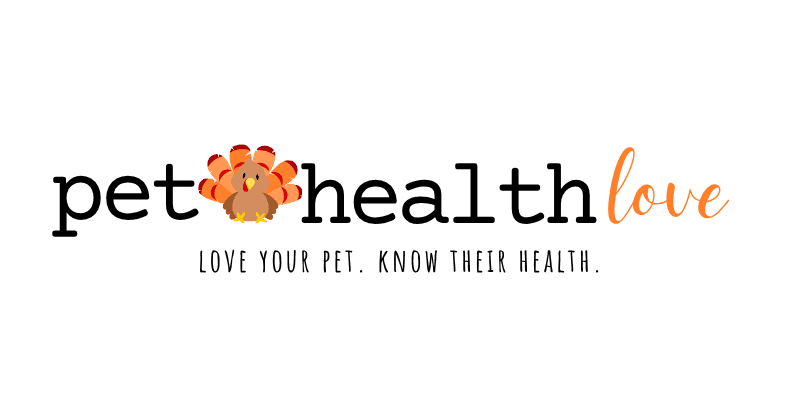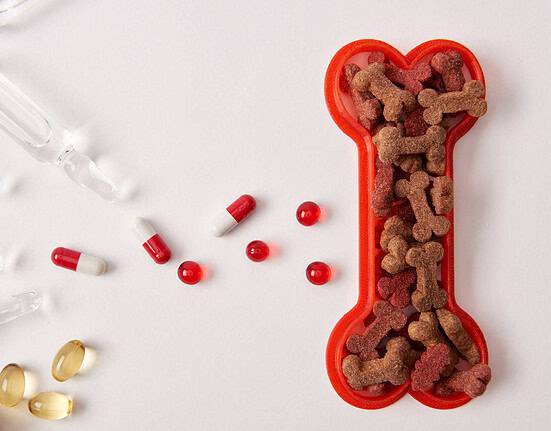Last updated on May 18th, 2025 at 05:05 pm
If you’ve ever browsed the pet aisle or scrolled through online shops, you’ve probably seen countless bottles of dog vitamins promising better joints, shinier coats, and stronger immune systems. But do dogs really need vitamins and supplements—and do they actually help?
As a veterinarian, I get this question a lot. Let’s break down what dog vitamins are, which ones matter most, and when (or if) your dog actually needs a supplement.
Affiliate Disclaimer: This post may contain affiliate links, which means we may earn a small commission if you purchase something through our links. This helps support our website and allows us to continue providing valuable content. See our full disclosure here.
What Vitamins and Minerals Do Dogs Really Need?
Just like people, dogs need a variety of vitamins and minerals to stay healthy. Dogs need these vitamins, too, although it is very important that to understand they may need them in different amounts than people do.
These nutrients help support everything from their bones and brain to their skin and digestion.
Here are some of the most important dog vitamins and minerals:
Vitamin A – supports vision, growth, and immune health.
Vitamin B (like B1, B6, and B12) – aid in energy production, nerve function, and red blood cell formation.
Vitamin C – protect your dog’s body by fighting off harmful molecules and reducing inflammation.
Vitamin D – helps regulate calcium and phosphorus, critical for growing bones especially in puppies.
Vitamin E – acts as an antioxidant and protects cells.
Vitamin K – needed for proper blood clotting. Vitamin K is a fat-soluble vitamin instrumental in activating your dog’s blood’s ability to clot. Ingestion of certain rat and mouse poisons inhibits dogs’ ability to use vitamin K in their bodies, which can lead to hemorrhaging and death if not treated.
Calcium – builds and maintains strong bones and teeth.
Iron – essential for healthy red blood cells and oxygen transport.
Magnesium – helps muscle and nerve function.
Phosphorus – works alongside calcium for skeletal health.
Zinc – important for skin health and wound healing.
How Do These Nutrients Support a Dog’s Body?
Each nutrient plays a unique role in your dog’s overall health:
Vitamin A is key for maintaining healthy skin, eyes, and coat.
B vitamins help convert food into energy and support brain function.
Calcium and vitamin D are the power duo for growing puppies and senior dogs with aging bones.
Vitamin E and C (yes, dogs can produce their own C, but some still benefit from extra) help reduce inflammation and fight oxidative stress.
Zinc keeps your dog’s skin barrier strong and helps prevent infections.
When dogs don’t get enough of these, or get too much, problems can pop up.
Common Nutrient Deficiencies (or Excesses) in Dogs
Most dogs eating a complete and balanced commercial dog food get all the nutrients they need. But here are some signs of imbalances to watch out for:
Deficiencies
Vitamin A deficiency can cause a dog to have a dull coat, poor growth, or vision problems.
A calcium deficiency can lead to muscle twitching, poor growth in puppies, or weak bones.
Similar to rickets in humans, dogs can develop this disease when their diet has an imbalance of calcium and phosphorus. Rickets mainly affects young, growing dogs’ bones, causing them to weaken. This happens when there isn’t enough calcium or phosphorus for proper bone growth. It’s most common in all-meat or homemade diets that lack phosphorus or vitamin D.
Iron deficiency can cause pale gums, fatigue, and poor stamina.
A zinc deficiency can lead to hair loss, skin scaling, or crusty lesions, especially in northern breeds.
Excesses
Vitamin D overdose can lead to kidney failure, vomiting, and muscle weakness.
Too much calcium (especially in large breed puppies) can lead to skeletal abnormalities.
The most common cause of vitamin D overdose I see in practice is accidental ingestion of human supplements or multivitamins that contain high levels of vitamin D. Dogs are curious, and even one chewable tablet meant for humans can lead to toxic levels. I’ve also seen cases caused by well-meaning owners giving over-the-counter dog vitamins on top of a balanced diet—resulting in too much vitamin D over time.
In rare cases, it can happen due to a commercial dog food error or eating rat poison that contain cholecalciferol (a form of vitamin D).
As for calcium, I’ve seen the most issues in large breed puppies when owners add calcium supplements to their food, thinking it will help them grow strong.
Unfortunately, too much calcium during development can actually lead to joint problems and skeletal deformities.
That’s why I always recommend talking to your vet before adding any supplements—more isn’t always better when it comes to vitamins and minerals.
Dog Vitamins vs. Diet – What Matters Most?
Here’s the deal: food comes first.
If your dog eats a complete and balanced dog food labeled “AAFCO approved,” they’re already getting the right amount of vitamins and minerals.
AAFCO stands for the Association of American Feed Control Officials, and when you see this label, it means the food has been formulated to meet the minimum nutritional standards for dogs based on their life stage (like puppy, adult, or senior).
That said, dog vitamins can help in some situations:
- Dogs with medical conditions like kidney disease (these patients often lose B vitamins through increased urination.)
- Pregnant or nursing dogs (more calcium needed for milk production)
- Dogs on homemade or raw diets (which often lack key nutrients)
- Senior dogs with joint or immune support needs
In these cases, supplements can fill the gaps—but only the ones your dog actually needs.
A Vet’s Advice: What Dog Owners Should Know About Nutritional Balance
Start with high-quality dog food. Look for the AAFCO statement on the label—this ensures
your dog is getting the basics.
Don’t over-supplement. More is not always better. Too much of a vitamin can be just as harmful as too little.
Be picky with brands. Choose vet-recommended supplements or those made by reputable companies with quality control testing.
Tips for Choosing the Right Supplement
Selecting the right supplement for your dog can be a bit overwhelming with so many options available. To make sure you’re choosing the best one for your dog’s health, here are a few key tips:
1. Consult Your Veterinarian
Before giving your dog any new supplement, it’s a good idea to check with your vet. Every dog is different, so what works for one might not be right for another. Your vet can help you pick the right supplement based on your dog’s health, age, and needs.
This is especially important if your dog has any health issues, as some supplements can interfere with meds or make things worse.
2. Check for Quality Seals
When shopping for supplements, make sure to look for the National Animal Supplement Council (NASC) seal on the label. This means the product has been tested and meets high quality and safety standards.
Supplements with the NASC seal are made to be consistent and pure, so you can trust they’re a good choice for your dog’s health.
3. Make Sure It Has the Necessary Ingredients
Each supplement should be aimed at your dog’s specific health needs. For joint support, look for ingredients like glucosamine, chondroitin, and MSM—they help with cartilage, inflammation, and mobility. If you’re focusing on digestive health, go for supplements with probiotics and prebiotics.
Just make sure the product has the right ingredients to tackle your dog’s unique health concerns.
4. Avoid Human Supplements
It might be tempting to give your dog human vitamins or supplements, but don’t do it! Human supplements can have ingredients that are toxic to dogs, like xylitol (a sugar substitute), iron, or too much vitamin D.
Always pick products made specifically for dogs to make sure they’re safe and have the right nutrients.
5. Monitor for Side Effects
Whenever you introduce a new supplement, keep a close eye on your dog for any signs of weird reactions. Common side effects might include gastrointestinal upset (like diarrhea or vomiting), changes in appetite or behavior, or skin reactions.
If you notice anything unusual, stop the supplement and reach out to your vet for guidance.
My Favorite Dog Vitamins and Supplements
As a veterinarian, I’ve worked with many dogs with different health needs, and I’ve found that the right supplements can truly make a difference. Here are some of my go-to recommendations for specific areas of health:
🦴 For Joint Health – Dasuquin
When it comes to joint health, Dasuquin with MSM is my top choice. This supplement combines glucosamine, chondroitin, and MSM to help maintain joint health and mobility in dogs of all ages, especially those with arthritis or other joint issues. It’s been shown to be effective in supporting cartilage and improving overall joint function.
🐕 For Skin and Coat Health – Zesty Paws
For healthy skin and a shiny coat, I recommend Zesty Paws Salmon Bites. These soft chews are packed with omega-3 fatty acids, which help reduce inflammation and promote a glossy, thick coat. They’re great for dogs with skin sensitivities or those that suffer from allergies.
🍽️ For Gut Health – Proviable
Maintaining a healthy gut is important for your dog’s overall well-being, and Proviable is one of my favorite probiotics. It contains a blend of beneficial bacteria to support digestion and restore balance, especially after illnesses, antibiotics, or stress. It helps promote a healthy gut flora and keeps your dog feeling their best.
I literally recommend this for all of my patients that come in for tummy issues.
Final Thoughts – Dog Vitamins
Dog vitamins can absolutely help—but only when they’re needed and used correctly. For healthy dogs on good food, you likely don’t need to add anything. But for pets with special health needs, the right supplement can make a real difference.
👉 Does your dog take vitamins? I’d love to hear what’s worked for you—drop your favorite supplement in the comments or share your experience!


















Leave feedback about this